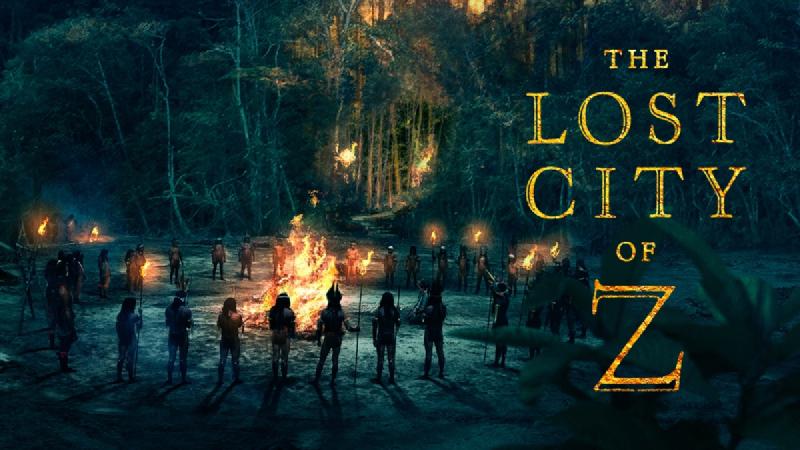British soldier Percy Fawcett is contracted by the Royal Geographical Society to chart a river in the Amazon. During the journey he encounters remnants and stories of a lost city in the jungle. The experience leads him to embark on a series of expeditions to find what he has called The Lost City of Z.
You may want to watch the movie first and think about:
- How is the Amazon depicted?
- What does the movie make you think about the Amazon and the people who live there?
- How does the movie make you feel about the Amazon and the people who live there?
Depiction of nature
-
Amazon is a backdrop
- Not much time spent on details of the environment.
- Does not give much sense of the biodiversity
-
The green desert
- Uniformly, endlessly, green
- Yellow hue throughout gives sense of unreality
- No animals, fruit, or flowers
- Despite being in a rainforest, the explorers are initially unable to find any food on their own
-
Amazon as a barrier
- Begins as wild, impenetrable
- Becomes less hostile on Fawcett’s subsequent visits
-
England and tamed nature
- Image of a rural idyll
- English country garden echoes images of a Garden of Eden
- Despite the beauty and calm of the landscape, Fawcett seems to yearn for the wildness of the Amazon
Relationship with Nature
-
Economic resource
- Exploration is for economic value. Faucett maps river so rubber plantations can be established
-
Challenge to be conquered
- Fawcett wants personal glory
- European desire to push boundaries
-
Barrier to civilization
- Begins as a “green hell”, inhospitable to ‘civilization’
- Over the course of the film Fawcett starts to see amazon as a home for people and, he suspects, a civilization
- Remains of city has since been found in the Xingu river basin, now called Kuhikugu
Relationship with amazonian peoples
- Fawcett begins with British colonial views of Amazonian peoples’ as primitives/savages. His views are depicted as changing in subsequent expeditions
- Impressed by their fishing techniques and their ability to cultivate the jungle
- Argued against interference in their lives, against violence towards them
- In reality Fawcett was more conflicted about Amazon peoples
- Theorized that ‘white indians’ from Europe had crossed the Atlantic and civilized them
Related reading
* [The hero of The Lost City of Z was no hero](https://www.washingtonpost.com/posteverything/wp/2017/04/12/the-hero-of-the-lost-city-of-z-was-no-hero/) \- The Washington Post - article
* [Cannibalism and the politics of bloodshed](https://www.cambridge.org/core/books/making-of-an-imperial-polity/cannibalism-and-the-politics-of-bloodshed/D4D05AE81BBADD074FBCDC09504605D3/core-reader) \- The Making of an Imperial Polity - book chapter
* [What is the white saviour trope](https://shadowandmovies.com/what-is-the-white-savior-trope-green-book/) \- ShowAndMovies.com - post
Problematic points
Rethinking what is ‘civilized/civilization’
-
Film does little to challenge the western/Eurocentric view of ‘civilization’ as tied to material culture.
- Fawcett uses pottery as marker of civilization worthy of exploration and ‘discovery’
- What Fawcett recognizes as cultivation of the rainforest, is monoculture plantation agriculture.
-
Related reading
- Ancient farmers transformed Amazon and left an enduring legacy on the rainforest - Science Daily - article
- The legacy of 4,500 years of polyculture agroforestry in the eastern Amazon - Nature Plants - journal article
Rethinking what is primitive
- As fellow humans peoples of the Amazon have been on Earth just as long as anyone else, and have history just as long as any other.
- ‘Necessity is the mother of invention’ : Change is often in response to changing needs and/or environment
- Behavioural and physical technologies can be effective though they may not look ‘modern’
Progression
-
Many of us are taught to think of history as progression or advancement
- Tend to view practices and technology which appeared earlier in our history as being less advanced
-
Useful analogy is the concept of ‘living fossils’, plants and animals which appear to be largely unchanged from their fossil ancestors
- Doesn’t mean there have been no changes
- The physiology is just as suited to survival and reproduction today as it was for the now fossilized ancestor
-
Related reading
- Let’s make living fossils extinct - The Guardian - article
- ‘Living Fossils aren’t really a thing - PBS Eons - video
Thinking about present relationships with indigenous peoples
-
Still colonial/extractive
-
Cultural tourism can often still be colonial. Takes important practices and reduces them to an experience for personal enjoyment. Often separated from meanings, history, and significance for the people.
-
What has changed for these people to now require money from outsiders?
-
Related reading
- Pitt Rivers Museum removes shrunken heads from display after ethical review - Museums Association - article
The role of women
- Does little to challenge Fawcett’s exclusion of his wife from his expeditions
- Contemporary with Marianne North, who went on similar expeditions on her own
- About Marianne North - BotanicalArtAndArtists.com

